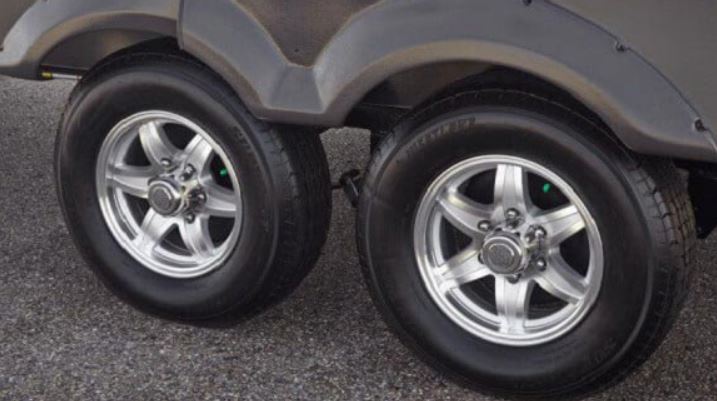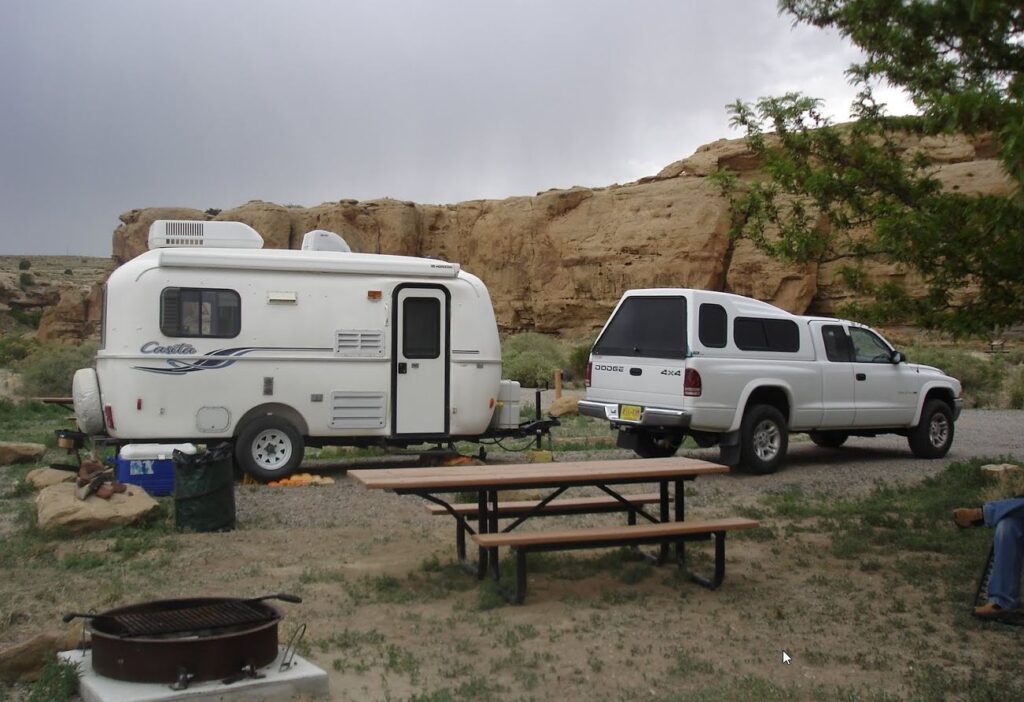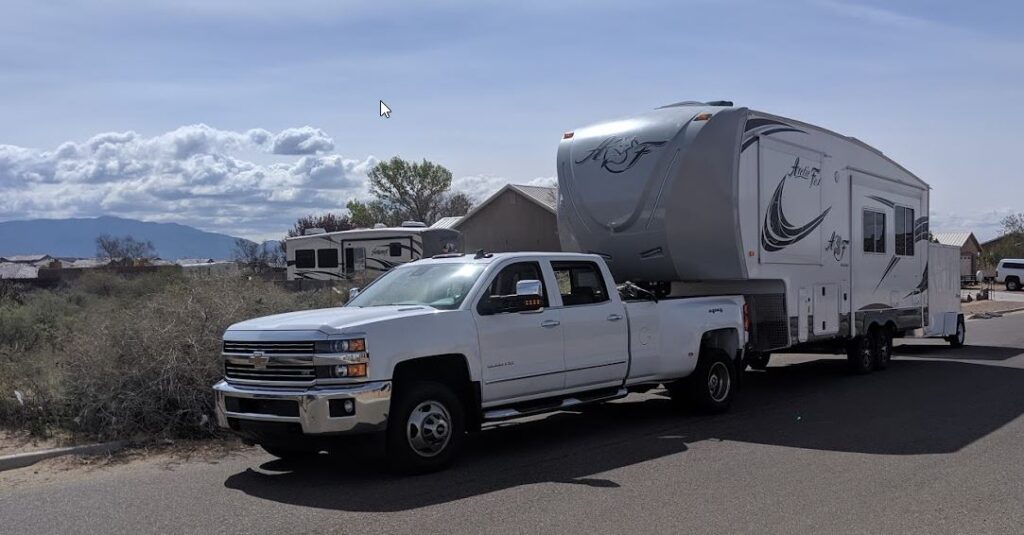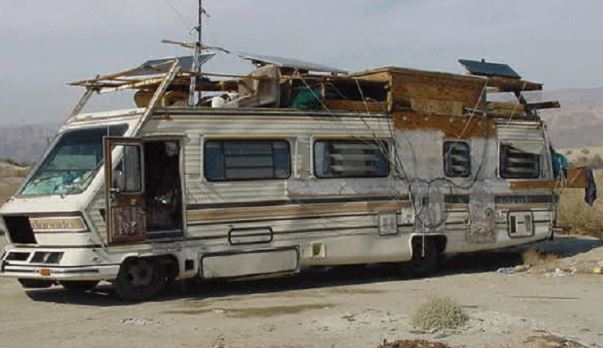The tires on your RV camper are probably the most important safety component while you are on the road. They carry a large amount of weight and sadly are often neglected. When they go bad not only do you have to deal with the safety of controlling the vehicle and getting stopped, but they can cause a tremendous amount of damage. Rubber and steel flapping around as you continue down the road can cause thousands of dollars of damage by tearing up flooring, wiring, plumbing, etc. It is not uncommon to hear about someone who didn’t even know they had a flat/blowout until they hit their next stop and physically saw it. YIKES! Camper tire safety is critical to reducing problems on the road.
You can’t guarantee you won’t have problems with your tires, but you can greatly decrease the odds of having problems and hopefully minimize damage should you have a failure.
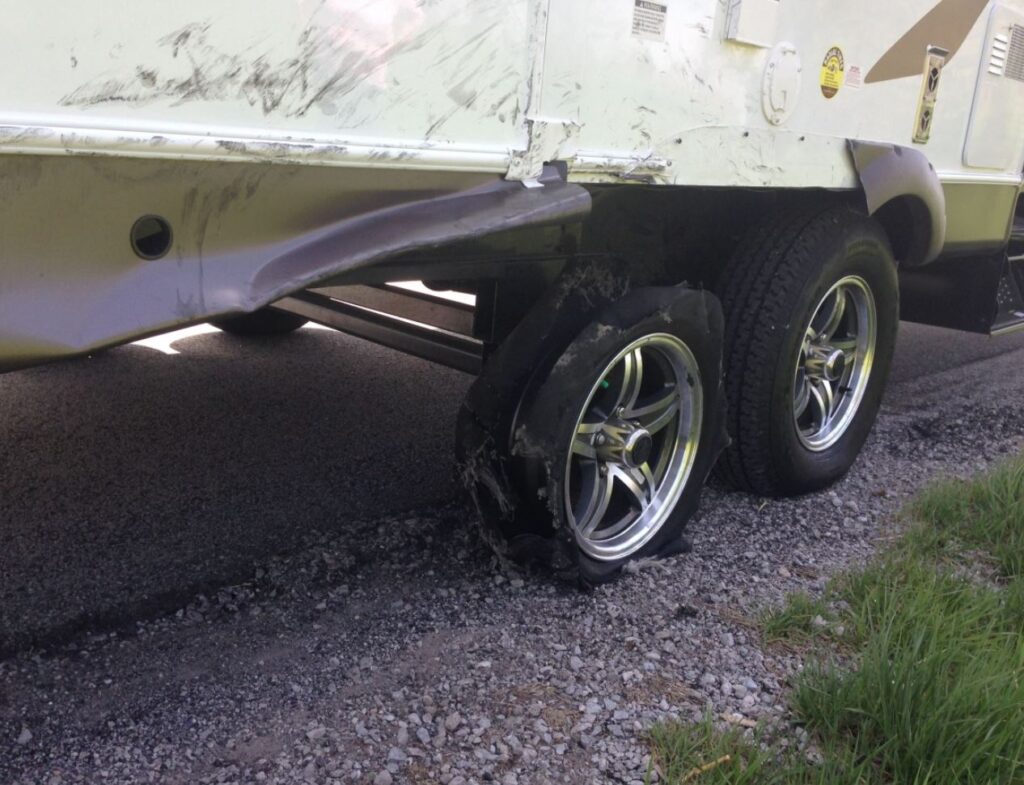
Tire Visual Inspection
Every single time, before I get on the road, I do a walk around inspection of my rig. A key component of this check is to take a look at the tires.
- Check to make sure they “look right”. Tread wear, sagging, not aligned. This can also catch suspension problems that may have happened.
- Look at the sidewalls, you are looking for cracking (a sign of age) and you are looking for bulges or inconsistencies in the surface that may indicate an internal problem for the tire.
- When you check the tread, you are not looking for how much tread is left. These things rarely run out of tread before the end of their useful life. You are looking for uneven wear on the tread. That means, don’t just look at the easily visible edge of the tread. You need to look at the whole surface that hits the road. Uneven wear usually indicates a suspension problem and can advance VERY quickly.
Tire Inflation / Weight
Under inflation is a tire killer. When under inflated, the sidewalls of the tires flex more than they should under the weight of the trailer going down the road. This generates heat and will eventually lead to failure.
At a minimum I check the tires at the beginning of a trip. If I’m out for more than a couple of weeks, I try to check every couple of weeks. As a working stiff that doesn’t happen as much as I would like…
Use the tire pressure recommended by the trailer manufacture that is generally on a yellow and white sticker somewhere on the left front of the trailer. If you have an older rig that doesn’t have this kind of label or are running a different tire than came with the camper, you should either find the tire manufacturer weight/pressure charts and air them up based on the weight they are carrying. Go 10-20% higher than recommended not exceeding the max inflation pressure stamped on the sidewall.
You are filling the tires when they are cold….IE: have been sitting for a couple of hours and best if not in direct sunlight.
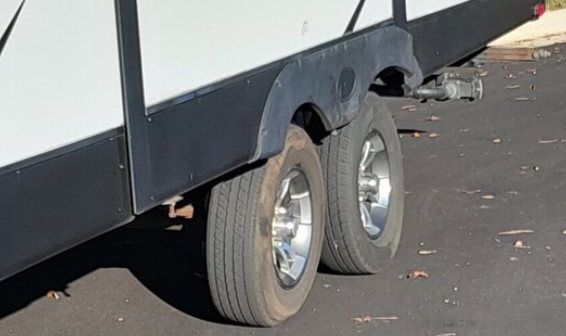
If you have a multiple axle trailer and you make tight turns your tires are even more stressed. The sheer forces of the tires fighting against each other can get pretty extreme. Higher tire pressure will decrease the amount of stress placed on the sidewalls of the tires.
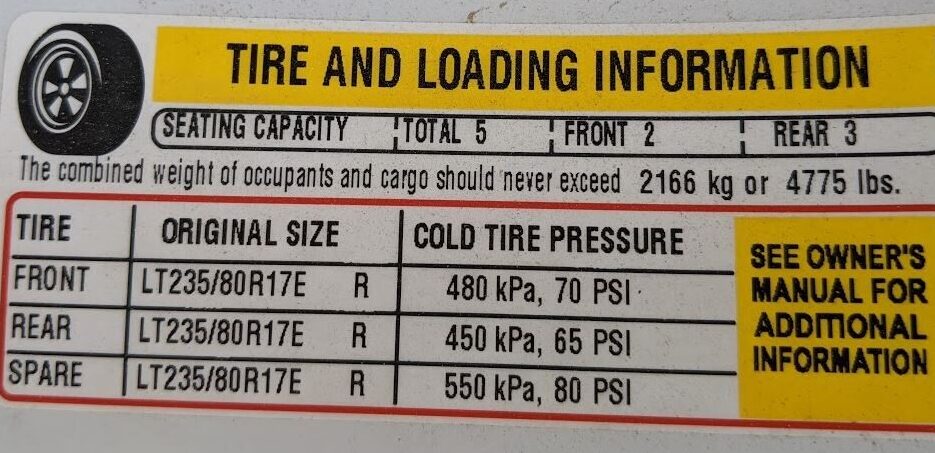
If you want maximum accuracy on tire pressure you will need to weigh your rig fully loaded for the road on a per wheel basis. This is tricky to do, however at some RV Rally’s and shows there is a team present with the equipment to do this for a nominal fee. Then with those accurate weights you can refer to the tire manufacturers loading tables.
Also, make sure your tires are rated for how much weight you are putting on them. Trailer manufacturers tend to use the minimum rating for the weight they should be carrying if your trailer is loaded to the maximum GVWR. When I replace tires, I go one weight rating up as an extra layer of safety.
Tire Age
Unlike your car, when it comes to camper tires, they will almost always age out before the tread wears out. For trailers they are not drive tires nor are they steering. They are just being dragged along behind and the tread just doesn’t wear down much. On motorhomes, they typically just don’t get enough miles to wear it down.
What does happen is the materials age out. The compounds in the rubber degrade due to temperature, UV and other conditions they must bear. The National Highway Traffic Safety Administration (NHSTA) and most tire manufactures don’t have specific age guidelines, but instead talk about regular inspections after 5 years or so with an expected life of 6-10 years.
Personally, I err on the side of caution on this one. If I have unknown or low reputation tires, I’ll replace them in the 3rd year. If I have a tire with a good reputation I’ll go 5 years. See Tire Brand below.
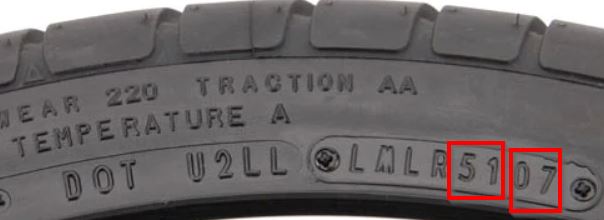
from Tire Rack
Tire Brand
There are a few key types of topics out on the innerwebs that will spark a long and drawn out discussion about the pro’s and con’s and why’s of everyone’s favorite tires. It gets exhausting. This is one of them with words like “china bombs” and “Goodyear Exploadathon” flying around.
For example, Goodyear had the Marathon trailer tire out there for many years. I’ve had them on campers. They had a bad reputation on the interwebs for sure with lots of reports of blowouts. But I believe they also had more camper tires on the road than anyone else. They were used by many trailer manufacturers and were often “marginal” in weight rating against the GVWR of the trailer. My Casita was like this and depending on how the weight was loaded it could pretty easily get more weight on the tires than they were rated for. What I’m trying to say is I don’t think it was entirely the tires fault.
I am cautious around strange branded tires, in particular from China. There are a TON of them out there will all kinds of different ratings. That said, there are tire brands on the market that most people haven’t heard of that are actually quite good. Like Sailun – these guys have a really good reputation on the interwebs.
Right now I’m running Goodyear Endurance that should have a good 2-3 years left on them. When it comes time to replace, I will work with my tire dealer (Discount Tire) and see what they carry – then do a bit of research before I commit. I’m also starting to contemplate replacing the no-names on my utility trailer that is only about 2 years old.
Tire Pressure Monitoring System (TPMS)
No matter what we do, things can happen. All we can do is be reasonably to be prepared.
I believe that much of the damage that happens to campers when tires fail is caused because the driver is totally unaware that something has happened back there. Believe it or not, you have have a blowout on a dual axle trailer and not hardly notice anything up in the cab of the truck. Less likely on a motorhome or a single axle trailer, but I have heard of it.
For that reason I’m a strong believer in having a TPMS system. Mine is this one from Tire Minder that I’m happy with, but there are other brands.
They consist of small transmitters that screw on to the valve stem of your tires. These units watch the air pressure and usually also the temperature that you are running at. The transmitter talks to a receiver you have with you in your vehicle cockpit, sometimes via a repeater you install somewhere near the tires. The receiver not only displays the info from the transmitters, but you also have alarms should the temp rise or pressure fall below pre-defined thresholds.
While I can’t say I won’t go on the road without this system, I feel so much more confident knowing that if there is a problem with one of my tires I will know about it very quickly and be able to take care of the situation before it gets much worse.
Balancing
For whatever reason, there is controversy on the interwebs about the need to do this. I know some tire shops even say it is not needed. I pretty strongly disagree! Have you ever drove down the road in your passenger vehicle without balancing and feel it? It can introduce a lot of vibration all the way up to being completely unsafe. My thought is why put your camper, suspension, etc through that…..just get them balanced!
Also – many manufacturers do NOT balance the tires at the factory – so take it to the local tire shop and get it done.
Summary
The tires of your camper (and tow vehicle) are the only thing that sites between you and the road. Hopefully this information will help you care for your tires in a way that will prevent you from having a potentially nasty problem while out on the road.
I’ve been blessed and only had two tires fail while out on a trip. One in the Casita and the other in the Arctic Fox. The Casita went flat while we were in a campground, but the Fox developed a medium speed leak while on the road that I learned about from my TPMS. I do credit diligence in the tires care for at least part of my luck!
There is a lot more great information in the Beginners Guide so go check it out. Oh yeah, and don’t forget to go tell us all out about your experiences or questions in the Fix Your Camper Member Community!

